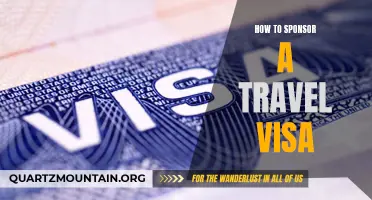
Are you planning a trip to Vietnam and wondering whether you need a visa? Understanding the travel requirements for your destination is essential to ensure a smooth and hassle-free journey. Vietnam, a country known for its rich history, stunning landscapes, and vibrant culture, has specific visa requirements that visitors need to be aware of. Whether you are traveling for business, leisure, or any other purpose, knowing whether you need a visa to visit Vietnam is the first step in planning your trip. In this guide, we will walk you through the different visa categories, the application process, and the requirements to help make your travel to Vietnam a breeze. So, sit back, relax, and let's explore whether a visa is required to visit this beautiful Southeast Asian country.
What You'll Learn

Overview of Visa Requirements for Traveling to Vietnam
If you are planning to travel to Vietnam, it is important to be aware of the visa requirements. Depending on your nationality and the purpose of your visit, you may or may not need a visa to enter the country.
Visa Exemption:
Vietnam has a visa exemption program. Citizens of certain countries are eligible to enter Vietnam without a visa for a specified period of time. The exemption period varies depending on the country of citizenship. For example, citizens of Japan, South Korea, Russia, and several Nordic countries are exempt from a visa for up to 15 days. Citizens of several ASEAN countries, including Thailand, Malaysia, Singapore, Indonesia, and Laos, are exempt for up to 30 days. Meanwhile, citizens of the UK, Germany, France, Spain, and Italy are exempt for up to 15 days.
Electronic Visa (e-Visa):
For citizens of eligible countries who are not exempt from a visa, Vietnam offers an electronic visa (e-Visa) system. This online application system allows travelers to apply for a visa before their arrival in Vietnam. The e-Visa is valid for a single entry and allows a stay of up to 30 days. The processing time for an e-Visa application is usually three working days. There is an application fee that needs to be paid online during the application process.
Visa on Arrival:
Another option for obtaining a visa for Vietnam is the visa on arrival (VOA) process. This type of visa is only available for air travelers who arrive at one of the international airports in Vietnam: Hanoi, Ho Chi Minh City, Da Nang, and Nha Trang. To obtain a VOA, travelers must have a pre-approval letter issued by one of the Vietnamese travel agencies. This letter can be obtained online by submitting an application and paying a service fee. Upon arrival at the airport, travelers with a pre-approval letter can get their visa stamped at the Visa on Arrival counter after completing the necessary paperwork and paying an additional visa stamping fee.
Visa at the Embassy or Consulate:
If you are not eligible for visa exemption, e-Visa, or VOA, you will need to apply for a visa at the Vietnamese Embassy or Consulate in your country of residence. The application process usually involves submitting an application form, your passport, photos, and paying the visa fee. The processing time can vary, so it is recommended to apply well in advance of your intended travel dates.
It is essential to check the most up-to-date visa requirements before your trip, as visa policies can change. You should also ensure that your passport is valid for at least six months beyond your planned departure date from Vietnam. Remember that overstaying your visa is a serious offense and can result in fines and other penalties.
By understanding the visa requirements and following the necessary procedures, you can ensure a smooth and hassle-free entry into Vietnam. Enjoy your trip to this beautiful country!
Exploring Canada on an H4 Visa: Your Ultimate Travel Guide
You may want to see also

Exemptions for Visa Requirement in Vietnam
Vietnam is a beautiful country located in Southeast Asia and is becoming an increasingly popular tourist destination. If you are planning to visit Vietnam, it is important to know whether you need a visa to enter the country. Fortunately, there are exemptions for visa requirements in Vietnam, which means that some nationalities do not need a visa to enter and stay in the country for a certain period of time. In this article, we will provide you with information on the exemptions for visa requirements in Vietnam.
Visa exemption for certain nationalities:
Citizens from 24 countries are eligible for visa exemption for a specified period of time, ranging from 14 to 90 days. These countries include Japan, South Korea, Russia, Finland, Norway, Sweden, Denmark, Belarus, United Kingdom, France, Germany, Italy, Spain, Armenia, Azerbaijan, Luxembourg, Moldova, Kazakhstan, Kyrgyzstan, Laos, Cambodia, Indonesia, Malaysia, and Singapore. It is important to note that the visa exemption period varies for each country, so it is recommended to check the specific duration for your nationality before traveling.
Visa exemption for diplomatic and official passport holders:
Diplomatic and official passport holders from 56 countries are exempted from visa requirements for stays up to 30 or 90 days, depending on the bilateral agreements between Vietnam and their countries. These countries include Algeria, Argentina, Bangladesh, Brazil, Canada, China, Colombia, Cuba, Egypt, Hungary, India, Israel, Japan, Mexico, Mongolia, Morocco, Myanmar, Nigeria, Pakistan, Panama, Peru, Philippines, Poland, Qatar, Romania, Russia, Saudi Arabia, Serbia, South Africa, South Korea, Thailand, Turkey, United Arab Emirates, United Kingdom, United States, Venezuela, and many more.
Visa exemption for Vietnamese diaspora:
Vietnamese overseas holding foreign passports and their family members may be exempted from visa requirements for stays up to 5 years, depending on their specific situation. They are required to provide proof of Vietnamese origin, such as Vietnamese passport, birth certificate, or any relevant documents.
Visa exemption for special economic zones:
Visitors to Phu Quoc Island can enjoy visa exemption for stays up to 30 days. Additionally, visitors to the special economic zones of Van Don, Bac Van Phong, and Phu Quoc Island are also eligible for visa exemption for up to 30 days, with the possibility of extension.
It is important to note that these visa exemptions are subject to change, and it is recommended to check the latest information from the Vietnam Immigration Department or consult with the nearest Vietnamese embassy or consulate before making any travel plans.
In conclusion, Vietnam offers visa exemptions for certain nationalities, diplomatic and official passport holders, Vietnamese diaspora, and visitors to special economic zones. However, it is important to check the specific requirements and duration for your nationality before traveling. By taking advantage of these exemptions, you can enjoy a hassle-free journey to explore the rich culture, scenic landscapes, and vibrant cities of Vietnam.
Traveling Outside the US with an F1 Visa: Everything You Need to Know
You may want to see also

Types of Visas Available for Travelers to Vietnam
Vietnam is a beautiful country known for its breathtaking landscapes, rich history, and vibrant culture. Whether you are planning a vacation or a business trip, you may be wondering what type of visa you need to enter Vietnam. Here is a guide to the different types of visas available for travelers to Vietnam, so you can choose the one that best suits your needs.
Tourist Visa:
If you are visiting Vietnam for sightseeing or visiting friends and family, you will need a tourist visa. This visa allows you to stay in Vietnam for up to 30 days. You can apply for a tourist visa either at the Vietnamese embassy or consulate in your home country or online through the Vietnam Immigration Department's website. The online application process is convenient and straightforward, as you only need to fill out an online form and pay the visa fee.
Business Visa:
If you are traveling to Vietnam for business purposes, such as attending meetings, conferences, or negotiating contracts, you will need a business visa. This visa allows you to stay in Vietnam for up to 90 days. To apply for a business visa, you will need an invitation letter from a company or organization in Vietnam, confirming the purpose of your visit. You can then complete the visa application process either at the Vietnamese embassy/consulate or online.
Work Visa:
If you plan to work in Vietnam, you will need a work visa. To obtain a work visa, you must have a job offer from a Vietnamese company or organization. Your employer in Vietnam will need to provide you with a work permit, which you will submit along with other required documents to the Vietnamese embassy/consulate. The work visa allows you to stay in Vietnam for the duration of your employment contract.
Student Visa:
If you have been accepted into a Vietnamese educational institution, you will need a student visa. To apply for a student visa, you will need an acceptance letter from the educational institution, as well as proof of sufficient funds to cover your tuition and living expenses in Vietnam. The student visa allows you to stay in Vietnam for the duration of your studies.
Transit Visa:
If you are transiting through Vietnam on your way to another destination and will be staying in the country for less than 5 days, you may be eligible for a transit visa. This visa is typically issued at the Vietnamese airport, and you will need to show proof of your onward travel and a valid visa for your final destination.
It is important to note that visa requirements and regulations can change, so it is always a good idea to check with the Vietnamese embassy or consulate in your home country or visit the Vietnam Immigration Department's website for the most up-to-date information. Additionally, make sure to apply for your visa well in advance of your trip to avoid any last-minute complications. With the right visa in hand, you can make the most of your time in beautiful Vietnam.
Is It Possible for a Person to Travel with a U Visa?
You may want to see also

How to Apply for a Visa for Vietnam
Vietnam is a beautiful and diverse country with a rich history and breathtaking landscapes. If you are planning a trip to Vietnam, one of the first things you need to check is whether or not you need a visa to enter the country.
For many travelers, a visa is required to visit Vietnam. However, there are a few exceptions to this rule. Citizens of certain countries, including ASEAN member countries, are exempt from needing a visa for a limited period of time. Additionally, travelers from certain countries are eligible for visa exemptions under bilateral agreements with Vietnam. However, it is important to note that these exemptions typically have a time limit, so it is crucial to check the specific requirements for your country before traveling.
If you do need a visa to enter Vietnam, the process can be straightforward if you follow these simple steps:
- Determine the type of visa you need: Vietnam offers several types of visas, including tourist visas, business visas, and transit visas. Determine the purpose of your visit and choose the appropriate visa type.
- Gather the necessary documents: The specific requirements may vary depending on your country of residence, but generally, you will need the following documents:
- A valid passport with at least six months of validity remaining
- A completed visa application form
- Passport-size photos (usually two)
- Visa approval letter (for visa on arrival)
- Flight itinerary (for visa on arrival)
- Invitation letter (for business visas)
- Choose the application method: There are two main ways to apply for a visa for Vietnam - through the Vietnamese embassy or consulate in your home country, or online for a visa on arrival. The embassy or consulate method is typically more time-consuming and requires in-person visits, while the visa on arrival method is more convenient and can be done from the comfort of your own home.
- Apply for the visa: If you choose to apply through the embassy or consulate, visit their website or contact them directly for the application process and fees. If you opt for a visa on arrival, you can apply through a reliable online travel agency that specializes in visa services for Vietnam. Fill out the online application form and provide the required documents.
- Pay the visa fee: The visa fee varies depending on the type of visa and the method of application. The embassy or consulate will provide you with the payment details. If you are applying for a visa on arrival, you can usually pay the fee online using a credit or debit card.
- Receive the visa approval letter: If you apply for a visa on arrival, you will receive a visa approval letter via email within a specified timeframe. Print this letter and bring it with you to Vietnam.
- Arrive in Vietnam: When you arrive in Vietnam, present your visa approval letter (for visa on arrival) or your visa (if obtained through the embassy or consulate) to the immigration officer. Pay any applicable visa stamping fee and have your passport stamped with the visa.
It is important to note that visa requirements and regulations can change, so it is recommended to check with the Vietnamese embassy or consulate in your home country or consult a reputable travel agency for the most up-to-date information. By following these steps and planning in advance, you can ensure a smooth and hassle-free visa application process for your trip to Vietnam.
Can I Travel to Canada with a US F1 Visa? Your Questions Answered
You may want to see also
Frequently asked questions
Yes, most travelers need a visa to enter Vietnam.
You can apply for a visa either through the Vietnamese embassy or consulate in your country, or you can apply for an e-visa online.
No, visa on arrival is not available for all nationalities. You must apply for a visa in advance either through the embassy or online.
Some nationalities are exempt from visa requirements for short stays or transit in Vietnam, usually for a duration of 15 days or less. It is recommended to check with the Vietnamese embassy or consulate in your country to confirm if you need a visa.
The visa fees can vary depending on your nationality and the type of visa you are applying for. It is best to check with the Vietnamese embassy or consulate in your country or the official government website for the most accurate and up-to-date visa fees.







